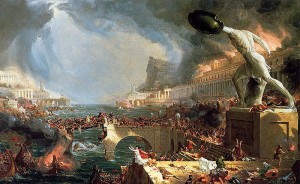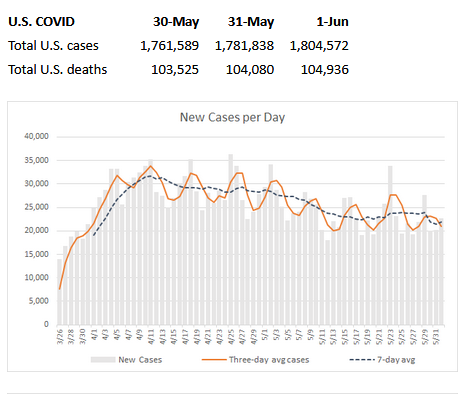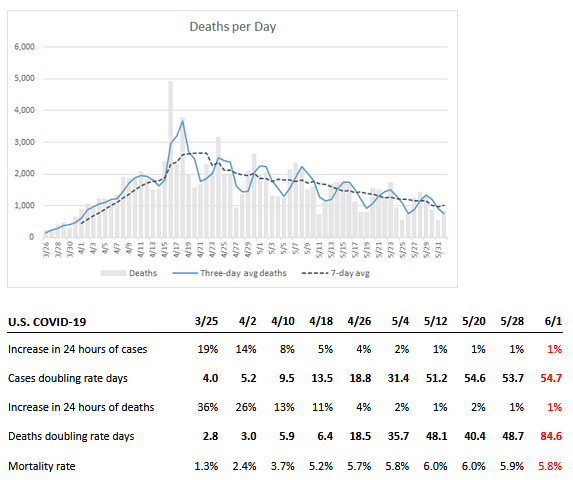
The Course of Empire by Thomas Cole
Sometimes it is necessary to re-post older articles. We’ve been in the Fall Of Neoliberlism period for some time, but a larger era is that of War and Revolution. The failures and the end of neoliberalism are part of this era, but it is more than their sum, because it also the end of an ecological era and the beginning of a new technological era (telecom and autonomous robots.)
With the eruption of riots due to the failures of neoliberalism and US imperialism (Covid-19 was mostly a given, the response was not), I think it’s worth revisiting this article to set the scene.
This is the age you will live in for most of your life if you are young. If you are old, it is your permanent fate. Originally posted April 26th, 2017.
I have labelled the next era “the age of war and revolution,” in fact, I’ve even made a blog category for it.
I expect this for economic, geopolitical, technological, and environmental reasons.
Economic
The developed world has soaring inequality and is stagnated. Real value is not being created, instead it is being cannibalized through financial games by rentiers; they take all the profits and download all the risk on to others, as the 2008/9 bailouts illustrated (the bankers are fine, no one else is).
Deliberate austerity through political decisions has damaged the economy. Demand has been insufficient for decades, but we are now extremely sclerotic after the response to the financial crisis was “bail out the people who caused it, make everyone else pay.” Even by the logic of capitalism, this is crazed: Capitalism says, “If you lose your money, you weren’t allocating it properly.” Capitalism works, to the extent that it works, because people who make good allocation decisions get more money, and thus, get to make more allocation decisions, while those who allocate money (really, resources) badly, lose it, and no longer get to make as many decisions.
Bankers, who are the primary resource allocators in our society (it is not even close, they create the vast majority of all money, not governments), made such bad decisions, on aggregate, that they lost all their money. Under capitalism, that’s how it would have stayed, and other people would have taken over their function, having learned from their loss.
Because we refused to do this, the opposite lesson was learned, which was: ‘Do more of this.’ And so, the policies which drove us into the ground continue.
Now, like the old-fashioned white male CIS blah, blah, that I am, I am lumping a lot of the social issues under the umbrella of economics. That isn’t because they are entirely caused by economics, but because economics is the independent variable which is driving the rise of the “alt right” and so on. As the economy has become worse, people have fallen back on whatever identity they already have, and found enemies. That is what people do.
Back in the mid 70s, I said to my father “I don’t see a lot of racism.” (I lived in Vancouver, flush with Chinese.) He shook his head and said, “No, because times are good. Wait ’til times are bad, you’ll see plenty then.” My father was a child of the Great Depression.
‘Nough said.
Alternatives to neoliberalism will continue to rise. Neoliberalism is now a zombie. It still shuffles along, eating brains, but it’s dead and the only question is how many people it will impoverish and kill before it dies. Well, and what will replace it.
I want to emphasize something here: almost all social welfare statistics track economic inequality, not absolute access to goods. People are happy, or sick, or whatever, based on how unequal their society is, and almost nothing else, provided the society is beyond the bare subsistence level.
Inequality matters, it drives almost everything. People who feel unequal are unhappier, stressed and sick. The data on this is conclusive, those who wish to read it, may look it up in the book “The Spirit Level”.
So it doesn’t matter if Thelma has a TV and a smartphone, what matters is that she’s scared all the time because if she loses her job she’s screwed, and as a result she has to do whatever her boss says. She has little real freedom, save the right to become homeless. And that fear is constantly there, even if it is subconscious.
This fear goes right through the economy, including in many who would be considered upper class (not rich, but the professionals who make 150K+/year). Anecdotally, almost all upper class and upper middle class women seem to be on psychoactive prescription drugs, for example.
Economic problems take time to ripple thru political system because after 30 most people don’t tend to change their views. They believe what they believe, they are who they are, and while age produces real changes, it doesn’t tend to change their politics, absent absolute catastrophe.
But we are now moving to the other side of that. For decades people put up with decline, but now the youngsters, some of whom are in their early 30s, have never known anything but a failed system and a bad economy. This political world has never worked for them, ever: they have no emotional investment in it, no habit of supporting it.
So, as we continue our economic decline; as inequality gets worse and worse, and as the coming generations move to the age where they are politically viable, the current time ends.
The next set of rulers and their supporters will try new things; new systems. They will be willing to revolt. The age of neoliberalism is all but over.
Geopolitical
The United States is in decline. China is now the world’s largest manufacturer, with a larger population.
Historically, declining empires (and if you don’t believe that the US is an empire, please search for a map showing all American overseas military bases and consider that the US routinely bombs countries it doesn’t like, without a declaration of war), always spawn wars and crises. The decline of England spawned two world wars, fighting against the rising power, Germany. (America won that.) Spain’s decline caused great convulsions, and so on.
America arrogates a great deal of power to itself. China building islands in what is, after all, their near sea, is China saying “we are the power here, not you. You cannot use your fleet here freely any more.” (Well, the US still can, but not for much longer, if China doesn’t like it.)
In pre-industrial societies military power did not always (or even often) track economic capacity. (The Chinese, twice conquered by horse nomads, are well aware of this.) But in industrial and post-industrial societies it does. He who can make the most weapons that are good enough and match to soldiers, wins, with limited exceptions.
Which is to say, while China does not have the military the US has, yet, it now has the potential to have a bigger, stronger one. More industry, more people.
Though people are becoming less important, which leads us to…
Technology
The technology of warfare and production are both changing. I am not convinced automation has reached the tipping point people make it out as having done, the industrial revolution did the same and was handled, but rising automation into sclerotic demand and an insistence of distributing money thru jobs is one of the factors driving the economic problems we already discussed. The more capitalists think they don’t need workers, combined with refusing to do something akin to a basic income or employ less people for more money or radically decrease the work week without decreasing wages, the greater the problem.
The change in warfare is more interesting, and deeply problematic. As many people have observed, Orwell among them, violent technology underwrites constitutions. Mass armies full of riflemen, where women must work in the factories lead very directly first male then universal sufferage. Ancient Greek City states and Swiss cantons enfranchised exactly the fighting population.
Iraq saw the rise of area denial warfare, where the state could not be defeated on the field, but could not rule. Now we are moving to a world of drones and autonomous robots. People will be less and less needed to fight wars. This is not a good thing, but—
—drone and autonomous robot technology is not necessarily a tech for the powerful. In fact, I suspect this is a technology of the weak. They aren’t that hard to make and will become increasingly easier to make. Any idiot who wants to make them will eventually be able to do so.
So you wind up either with police states (which we are moving towards, with our extreme surveillance societies) or societies where anyone can be killed. There is no way most leaders can be defended, it cannot be done.
I will not cry for this. The ridiculous ramparts in world capitals, which did not exist 60 years ago, exist exactly because politicians no longer work for their populations. Ages of assassination also tend to be ages where the population is better taken care of, because the best way to keep someone from committing political violence is to keep them happy. A man who is happily married, who is relatively equal, who looks forward to his life and feels he can do things that are meaningful does not build drones in his basement.
Happy people who are in loving relationships and/or enmeshed in supportive communities may commit horrific communal violence, but they don’t tend to become terrorists.
However, the point is that the tech will become more and more available, and another age of terror and assassination will arise in its wake. To avoid that we will have reorganize our societies: we can do so either by making them surveillance police states or by making people happy.
Environmental
We are facing a triple or quadruple threat. Climate change, environmental collapse, population increase and water shortages. Severe water shortages. These factors are going to make the crises much, much worse. Whole regions of India, China and the US will stop being agriculturally productive, due to aquifer depletion, for example. Swathes of land will become uninhabitable without air conditioning for months at a time. Changing rainfall patterns will make other, formerly productive land, unproductive.
Environmental collapse is harder to figure in, exactly, but as ecosystems collapse we can expect that to have unexpected and often catastrophic effects. Will the seas be taken over by jellyfish? What happens when all the alpha African predators are gone? Will honeybees wind up extinct? What happens to Japan when global fish stocks take their final swan dive (possibly recovering 25 years later)?
Meanwhile, while most developed countries have stable or declining populations, many developing countries have seen increases of a thousand percent or more, and will increase even further. This is especially the case in Africa, large swathes of which will be hit hardest by climate change.
All of this means that we will be undergoing a cyclical change (collapsing hegemonic power, new technology of violence, new technology of production) at the same time as we are facing environmental catastrophe with an unprecedentedly large population.
The so-called refugee crisis right now is nothing compared to those coming. Populations in the tens of millions will move within periods of just a few years. Countries which run out of water and thus ability to feed their population are very likely to go to war (if they don’t, their own populations will likely kill the leadership). Governments will collapse just based on environmental issues; wars will be fought over them, especially over water and arable land (this is one reason I am scared for Canada. When the US wants our water and land…)
Concluding Remarks
It is quite hard to predict history in the short term, where the short term means years, or even a decade or two. It is very hard to predict history in the long term of centuries or millennia. But between that it is quite easy. Each ideology, each empire, each economic system has a best by date. Some last longer than others, but all end, and they do so in fairly standard order.
We are near the end of an ideological order: neoliberalism. We are near the end of war-making technological era, with the rise of robots. We are near the end of a production technological era, with the rise of AI and bots.
Combined with environmental catastrophe (and nukes), this makes what is coming down the line much worse than the normal cyclical change. Much, much worse. We can create a better world, or a few better societies, out of it, to be sure, but there is probably no avoiding the Age of War and Revolution which is soon to be upon us.
The results of the work I do, like this article, are free, but food isn’t, so if you value my work, please DONATE or SUBSCRIBE.



 In this time of police brutality, who can we depend upon to police the police? Who can we depend upon to police the prosecutors? The judges? Our lawmakers? You. That’s who. It’s your job. More than that, it’s your duty to your fellow man. And it’s not really even very difficult. All it takes is a little creative thinking.
In this time of police brutality, who can we depend upon to police the police? Who can we depend upon to police the prosecutors? The judges? Our lawmakers? You. That’s who. It’s your job. More than that, it’s your duty to your fellow man. And it’s not really even very difficult. All it takes is a little creative thinking.